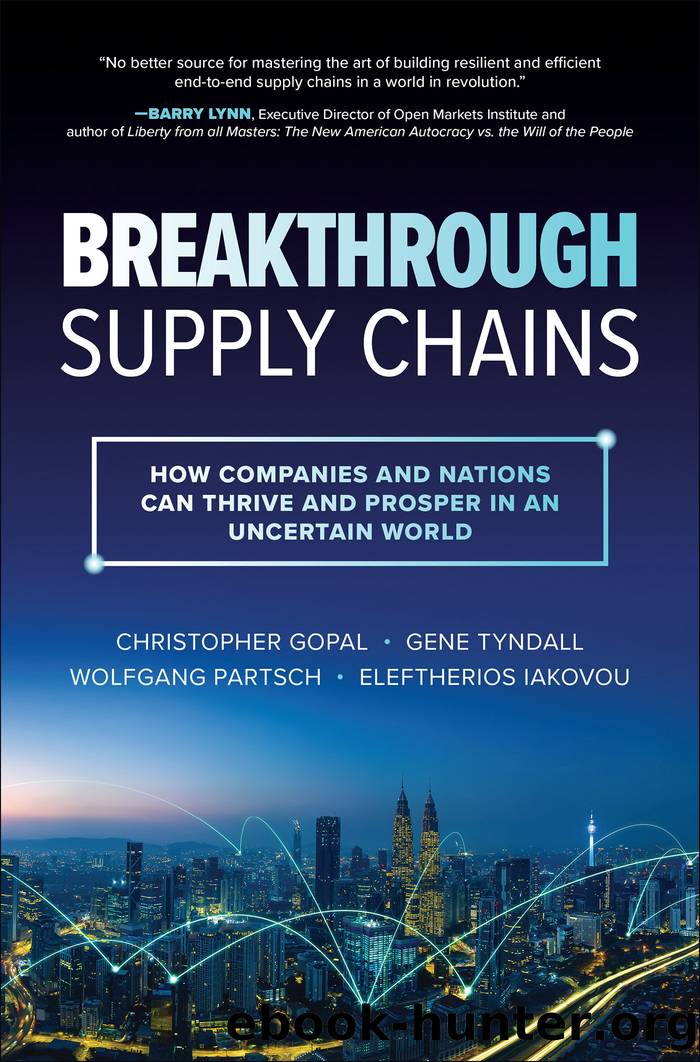Breakthrough Supply Chains: How Companies and Nations Can Thrive and Prosper in an Uncertain World (for True Epub) by Christopher Gopal Gene Tyndall Wolfgang Partsch and Eleftherios Iakovou

Author:Christopher Gopal, Gene Tyndall, Wolfgang Partsch and Eleftherios Iakovou
Language: eng
Format: epub
Publisher: McGraw Hill
Published: 2023-05-15T00:00:00+00:00
FIGURE 7.1 The Complex Global Supply Chain Faces New and Increased Risks
The global financial crisis of 2007â2009 was an inflection point for supply chain executives of multinational corporations (MNCs) who began recognizing that their overextended and just-in-time supply chains located in far-away and potentially risky countries were too fragile. This, coupled with the new (at the time) needs for regionalization and faster response times to customer orders, led to a slowdown in global trade and a restructuring of the global supply chain, with a shrinkage of global trade from 61 percent in 2008 to 58 percent of global GDP in 2019, just before the Covid-19 pandemic.
However, many companies continued to ignore these risks given the prospects of low costs, inexpensive engineering talent, financing, and favorable regulations and market access (especially in China, where many MNCs are often âwilling hostagesâ of the government). This was compounded by the âfinancializationâ of the supply chain, driven by a focus on short-term financial resultsâoperating margins, cash conversion, asset efficiency, and short-term share price increases tied to quarterly reports and executive compensation. It is not surprising then that the trend toward outsourcing and extensive offshoring to China and other Asian countries recovered and continued. This has led to the design of lean, offshored, and fragile global supply chains. In other words, companies often engineered the financials and the balance sheet and not the supply chain.
This became painfully evident during the Covid-19 crisis, which constituted another major inflection point for global supply chains. The global pandemicâthe largest global disruption in recent historyâhas had a huge impact on supply chains around the world. Risk mitigation was not strong enough, and supply chains were not resilient enough, to withstand these massive disruptions and their cascading effects across all industries. Almost every industry, every nation, and every citizen were affected. Manufacturing, retail, household products, and healthcare were among the most impacted, resulting in issues such as shortages, delays, facility closings, and arbitrarily canceled contracts (which hurt mainly small companies across the globe). The supply chain lessons from the pandemic demand new structures, a move away from unfettered globalization and toward an increased emphasis on decentralization and local operations (facilitated by modular supply chain design and technologies such as 3D printing), and new practices for risk management and cost-competitive supply chain resilience well into the future.
Supply chains were brought to the forefront of the public view for the first time. They attracted the attention and scrutiny of national governments and policy makers, who often lacked an understanding of supply chains, their complexities and impacts, and their roles in national economies and security, and importantly, any âsupply chain playbook.â Though they are now realizing that their supply chains are important, many still do not understand completely what their supply chains are, what to do about them, or how they should engage with the private sector, which has spearheaded the development of these supply chains for the past four decades.
The Covid-19 pandemic, compounded by the war in Ukraine, the Russian weaponization of
Download
This site does not store any files on its server. We only index and link to content provided by other sites. Please contact the content providers to delete copyright contents if any and email us, we'll remove relevant links or contents immediately.
Hit Refresh by Satya Nadella(8338)
The Compound Effect by Darren Hardy(7559)
Change Your Questions, Change Your Life by Marilee Adams(6641)
Nudge - Improving Decisions about Health, Wealth, and Happiness by Thaler Sunstein(6633)
The Black Swan by Nassim Nicholas Taleb(6191)
Daring Greatly by Brene Brown(5641)
Deep Work by Cal Newport(5464)
Principles: Life and Work by Ray Dalio(5322)
Rich Dad Poor Dad by Robert T. Kiyosaki(5149)
The Myth of the Strong Leader by Archie Brown(4789)
Man-made Catastrophes and Risk Information Concealment by Dmitry Chernov & Didier Sornette(4736)
Big Magic: Creative Living Beyond Fear by Elizabeth Gilbert(4723)
The Slight Edge by Jeff Olson(4722)
Discipline Equals Freedom by Jocko Willink(4635)
Digital Minimalism by Cal Newport;(4542)
The Motivation Myth by Jeff Haden(4527)
Stone's Rules by Roger Stone(4415)
Management Strategies for the Cloud Revolution: How Cloud Computing Is Transforming Business and Why You Can't Afford to Be Left Behind by Charles Babcock(4131)
The Doodle Revolution by Sunni Brown(4043)
